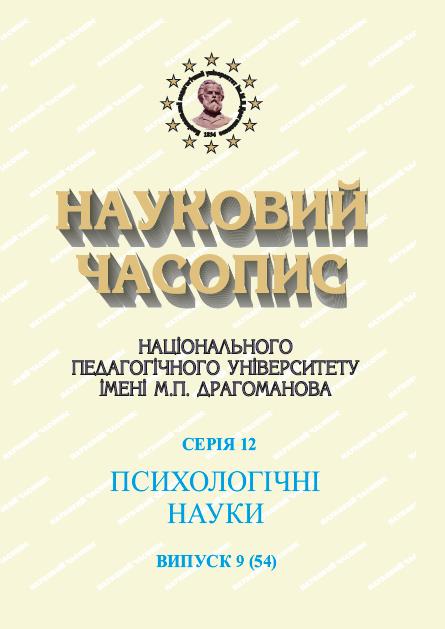DEVELOPMENT OF FUTURE TEACHERS’ VALUABLE-BASED ATTITUDE TO JUSTICE IN PEDAGOGICAL INTERACTION
DOI:
https://doi.org/10.31392/NPU-nc.series12.2020.9(54).06Keywords:
justice, value-based attitude, just actions, objectivity, impartiality.Abstract
The article is devoted to the study of development of future teachers’ value-based attitude to justice in interaction of educational process participants. It is stated that the pedagogical interaction subject’s value-based attitude to justice is a combination of his/her acknowledge equality norm towards other participant and just action. In substance, it is presented by the valuebased self-attitude of future teachers as potential subjects of just behavior and the value-based attitude to the students towards who it should be directed. It is noted that students of the Pedagogical University are not yet full-fledged subjects of pedagogical activity, so the formation of their value-based attitude to justice is carried out through the reflection of their teacher’s attitude towards them and development of value-based attitude towards themselves as potential teachers and carriers of moral and professional values. It is stated that, reflecting the pedagogical interaction of the teacher, most students tend to consider actions to be just if there is an objective evaluation of their educational activities results. Master’s degree students who have experience in pedagogical practice in general secondary education institutions give priority to a proper, just assessment of the student's efforts in learning process as a reward for the work done and teacher’s considered position in various pedagogical interaction situations. For bachelor’s degree students, more significant element in teacher’s just actions is a display of compassion and empathy, understanding of individual problems of studying subjects. It is revealed that, based on positive personal qualities of just teachers, students with different educational level and
experience of pedagogical interaction display value-based attitude to their personality, including in its structure positive traits of just behavior subject and also show a tendency to actively protect their right to acknowledge their personal dignity.
References
- Bekh, I.D. (2003). Vykhovannia osobystosti. Osobystisno oriientovanyi pidkhid: teoretyko-tekhnolohichni zasady [Educating the Person. A Personally Oriented Approach: Theoretical and Technological Foundations]. Kyiv: Lybid [in Ukrainian].
- Bulakh, I.S., & Dolynska, L.V. (2002). Psykholohichni aspekty mizhosobystisnoi vzaiemodii vykladachiv i studentiv [Psychological aspects of interpersonal interaction between teachers and students]. Kyiv: NPU imeni M.P. Drahomanova [in Ukrainian].
- Gulevich, O.A. (2011). Social'naja psihologija spravedlivosti [Social psychology of justice]. Moskva: Izd-vo «Institut psihologii RAN» [in Russian].
- Zabrotskyi, M.M. (2008). Osoblyvosti samostavlennia pedahohiv-pochatkivtsiv [Peculiarities of self-teaching of beginning teachers]. Aktualni problemy psykholohii. Ekolohichna psykholohiia: Zb. nauk. prats Instytutu psykholohii im. H.S. Kostiuka APN Ukrainy. 7 (15). 89-92. Retrieved from http://eprints.zu.edu.ua/3284/1/12.pdf [in Ukrainian].
- Klochek, L.V. (2019). Psykholohiia sotsialnoi spravedlyvosti u pedahohichnii vzaiemodii [Psychology of social justice in pedagogical interaction]. Doctor’s thesis. Kyiv [in Ukrainian].
- Liashenko, O.A. (2016). Psykholohichna pozytsiia rivnosti u mizhosobystisnii vzaiemodii maibutnikh vykladachiv [Psychological position of equality in interpersonal interaction of future teachers]. Candidate’s thesis. Kyiv [in Ukrainian].
- Molchanova, O.M. (2011). Vplyv vyny, soromu ta dokoriv sumlinnia na rozvytok sovisti v yunatskomu vitsi [The influence of guilt, shame, and reproach on the development of conscience in adolescence]. Mizhnarodnyi naukovyi forum: sotsiolohiia, psykholohiia, pedahohika, menedzhment. 5. 44-51. Retrieved from http://enpuir.npu.edu.ua/handle/123456789/1518 [in Ukrainian].
- Pavlyk, N.V. (2017). Psykholohiia harmonizatsii kharakteru v yunatskomu vitsi [Psychology of character harmonization in adolescence] Doctor’s thesis. Kyiv [in Ukrainian].
- Pashko, T.A. (2005). Indyvidualni osoblyvosti emotsiinoho samokontroliu starshoklasnykiv [Individual features of emotional self-control of high school students]. Candidate’s thesis. Kyiv [in Ukrainian].
- Prosandieieva, L.Ye. (2012). Psykholohichni zasady rozvytku samotsinnosti osobystosti v protsesi sotsializatsii [Psychological principles of self-esteem development in the process of socialization]. Doctor’s thesis. Kyiv [in Ukrainian].
- Savchyn, M.V. (2007). Pedahohichna psykholohiia [Educational psychology]. Kyiv: Akademvydav [in Ukrainian].
- Maes, J., & Kals, E. (2002). Justice beliefs in school: distinguishing ultimate and immanent justice. Social Justice Research. V. 15. 227- Retrieved from https://www.researchgate.net/publication/227090668 [in Germany].
- Van Beest, I., & Van Dijk, E. (2007). Self-interest and fairness in coalition formation: a social utility approach to understanding partner selection and payoff allocations in group European Review of Social Psychology. V. 18. 132. Retrieved from https://www.researchgate.net/publication/233221451.
- Wenzel, M., & Okimoto, T.G. (2010). How acts of forgiveness restore a sense of justice: addressing status / power and value concerns raised by transgressions. European Journal of Social Psychology. V. 40. 401-417. Retrieved from https://onlinelibrary.wiley.com/doi/abs/10.1002/ejsp.629

